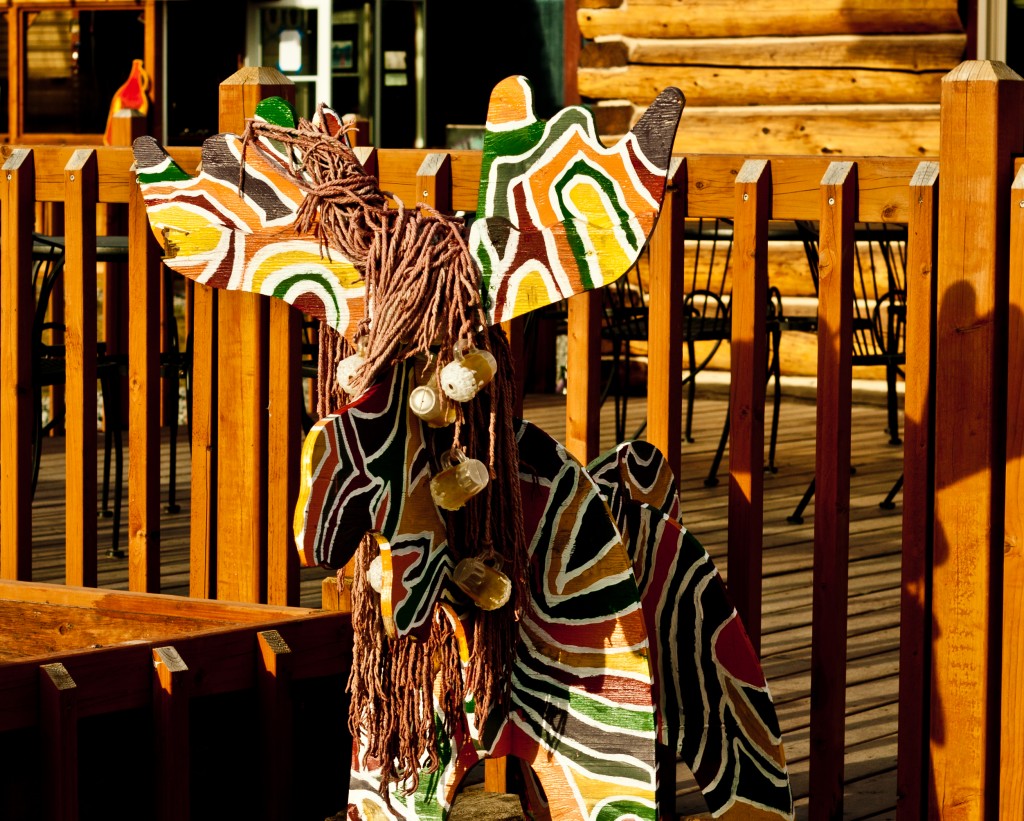
By Karla Fetrow
Where the road ends and life begins – Talkeetna bumper sticker
The building squats in the center of town, advertising itself as the Fairview Hotel and Tavern. There is an air about it, as though it plots and waits, an entity desirous of notoriety. Deep in October, late in the evening, no tourists jam the streets or crowd onto the balconies, but the town is still most definitely alive. Several of the almost equally ancient establishments twinkle with lights, and from the Fairview itself, tumbles erratic music and bursts of laughter. At the entrance is a parking meter, the only one in town. It leans to the side and is forever frozen at two hours parking.
In a rotting barrel is a small tree, leaning in the opposite direction. While we watch, a dog wanders up, lifts his leg and waters it. A second, than a third dog investigate, and improve on the high water mark. “Do they really think that tree will live?” We wonder out loud.
“Probably not,” said one of the locals who was passing by. “Every morning, the bucket is turned over, dirt is scattered everywhere. Whoever sees it first, cleans it all up, fills the bucket with dirt and puts the tree back in place. We don’t worry about it. It’s up to the tree whether it wants to survive or not.”
On one of the windows is plastered a big sign, “no dogs allowed. No, not even your dog. Except Sylvia.” Apparently, Sylvia is a very heroic and famous dog whose reputation is not to be taken lightly. Having no dogs with us to leave shivering out in the van, we entered unashamedly for a taste of Talkeetna local life.
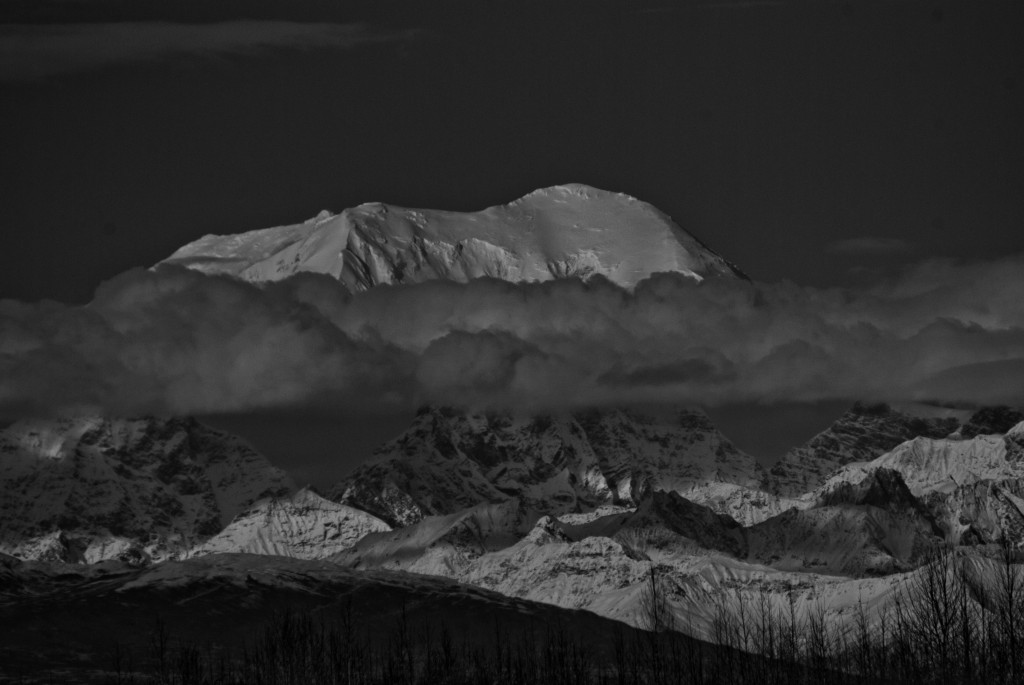
In the summer, hundreds of tourists pack into Talkeetna. It is the end of the road for mountain climbers hoping to scale the big one, which locals call Denali (Athabascan for the tall one) and the rest of the world knows as Mckinley. From there, it’s air service to the base, or a very long walk on a trail. It’s also the end of the road for prospectors. A charter flight sign reminds miners that they can walk for a week or fly for an hour to get to their claims.
In the summer, Talkeetna is the host of Alaska’s largest bluegrass festival. Held the first week of August, it draws in International visitors and musicians as well as the locals from around the state. Twice a year, it holds the Wilderness Woman’s competition, once in the month of July, but with the big events happening throughout the month of December.
Auctioning Bachelors for Charity
What is a wilderness woman required to do in order to win the contest? The qualifying event is the ability to carry two ten gallon buckets of water one hundred yards without spilling it. The race must take place in bunny boots and full winter gear. In the second round, the woman must open a beer and make a sandwich for the bachelor, than run into the carefully staged woods where she shoots a latex ptarmigan, saws a piece off a small birch round, snags a salmon and dodges an animated, even if it is artificial, moose. In round three, she must fill a snow machine sled with split wood than drive it back to a bonfire where the bachelors are sitting around exchanging the worst of their bad stories. All three events are timed. After penalties, if any, the fastest woman wins.
Although the contest is all in fun, there are some pretty big prizes for those stalwart women. Contest winners have won everything from gold nuggets to free flights to Hawaii and London. Second place winners have received hand crafted fur hats, bear claw necklaces, free meals, lodging and activities provided by Talkeetna businesses.
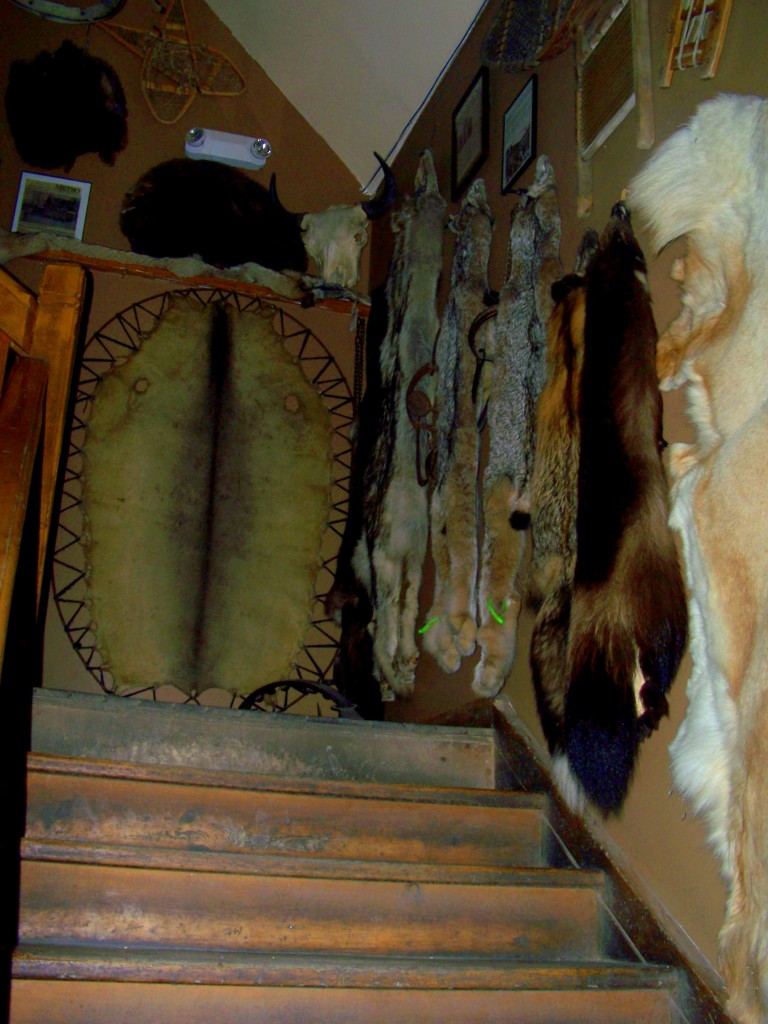
The evening attraction is the bachelor auction. The charity based wilderness woman’s competition is held to support the Sunshine community, located near the junction between the Parks Highway and the Talkeetna Spur Road. Sunshine maintains a low cost grocery store, that helps save the residents the necessity of driving fifty miles or more for their shopping needs, a medical clinic and a woman’s recourse center. While the aspiration to maintain these facilities is noble, the locals say that the intent of the wilderness woman’s competition was to attract more women. While it’s difficult to measure just how many women would have been attracted by the competition alone, there is no question that the bachelor auction draws in huge numbers.
The prospective bidders are very well treated. Those who land by plane are greeted at the airport with flowers. They are escorted to their hotels where they are accommodated as guests of honor. They cater diligently to the ladies, trying to impress them with their skills, their charms and their abilities. Only women twenty-one years or older and members of the Bachelor Society are allowed to attend the auction. Winning bidders are entitled to a photo, a drink and a dance with their bachelor — anything else is strictly up to the parties involved. After the auction, during the Wilderness Ball, the winning wilderness woman is crowned.
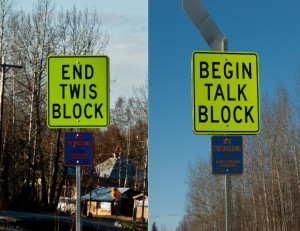
Each year, a male order catalog is circulated among the prospective clientele. It lists Talkeetna’s top thirty most eligible bachelors, along with a photograph and the answers to a few simple questions about their personal lives. Most of the answers reflect the first thing you learn when you enter the town; you’ve gotta have a sense of humor or you’ve lost the entire experience.
When one person was asked where he was from, he answered, “the Republic of Anchorage, aspiring to be a hillbilly now.”
A local bachelor answered simply as to where he had lived before, “in my mother”.
When one bachelor was asked what he did for entertainment, he answered, “Talkeetna is entertainment”.
One young fellow said his most exciting adventure was, “rescuing the pope from the jaws of a harbor seal. He was so grateful.”
Robert Forgit said the most exciting thing he’d done was to become the auctioneer at the Talkeetna Bachelor Auction. “Where else,” he said, “can you find one hundred fifty women screaming for thirty bachelors? Best odds for all the men.”
The Four Legged Boozers
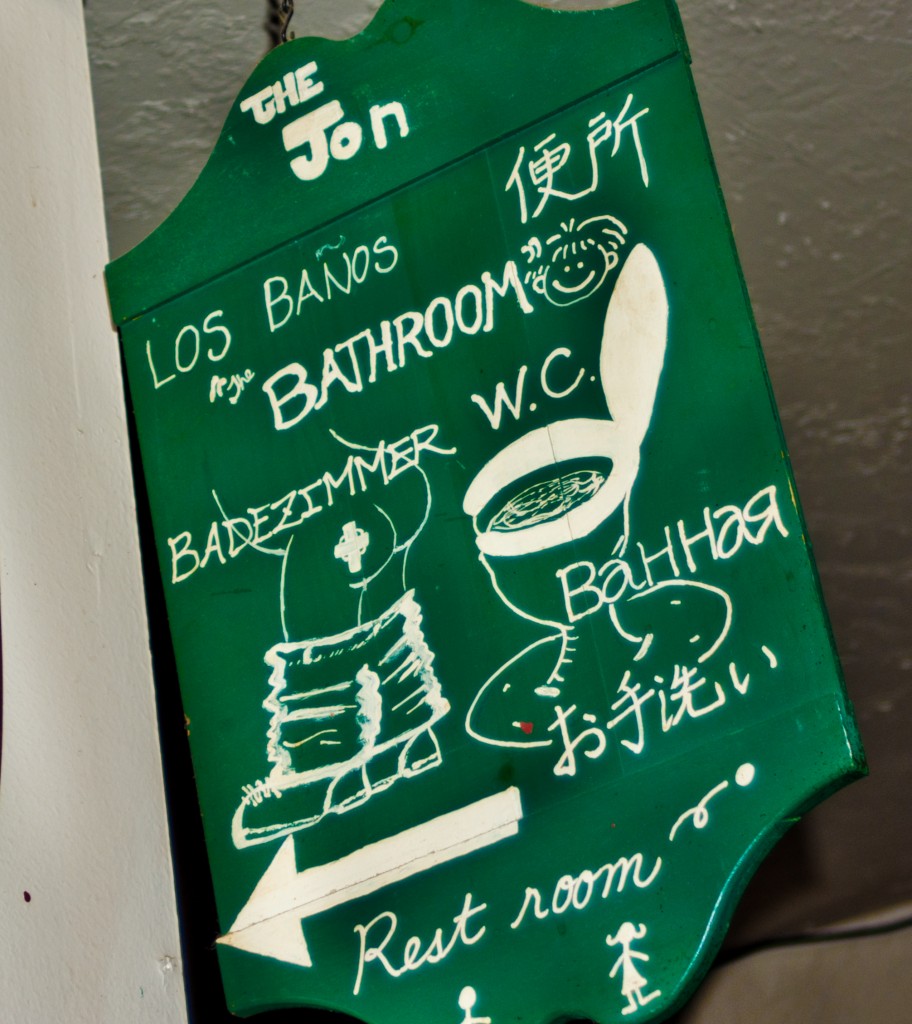
Humor is everywhere in Talkeetna. In front of an ice-cream display, the kind that has those deep tubs of twenty-one different flavors in the creamiest textures imaginable, a sign admonishes, “you have three minutes to make up your mind before we make it up for you. We pride ourselves in quick service.” Down the street, a collection of beer mugs dangle from the hemp rope mane of a psychedelic wooden moose. A pedestrian sign sports a crossing penguin. The hotel signs tell you if you don’t clean up after yourself, the mafia management will come after you.
At a bar, a woman laments that things just aren’t so exciting anymore. “At one time, this place really ripped,” she says. “But now, everything is just plain ordinary. It’s because of the horse.”
“What about the horse?” I encourage her, thinking I’m going to get a good story about old, bygone days.
“There used to be a horse that came in here all the time. Nearly every night, he’d come in and have some beer. One night, the horse drank a whole pitcher than pooped on the floor. It hasn’t been back since.”
“How long ago was that?” I ask, imagining at least several years.
“In August,” she answered simply. I count on my fingers. Three whole months since Talkeetna had enjoyed some entertainment. I was about to offer her condolences, when she continued. “It wouldn’t be so bad, but now we have a law against getting the moose drunk.”
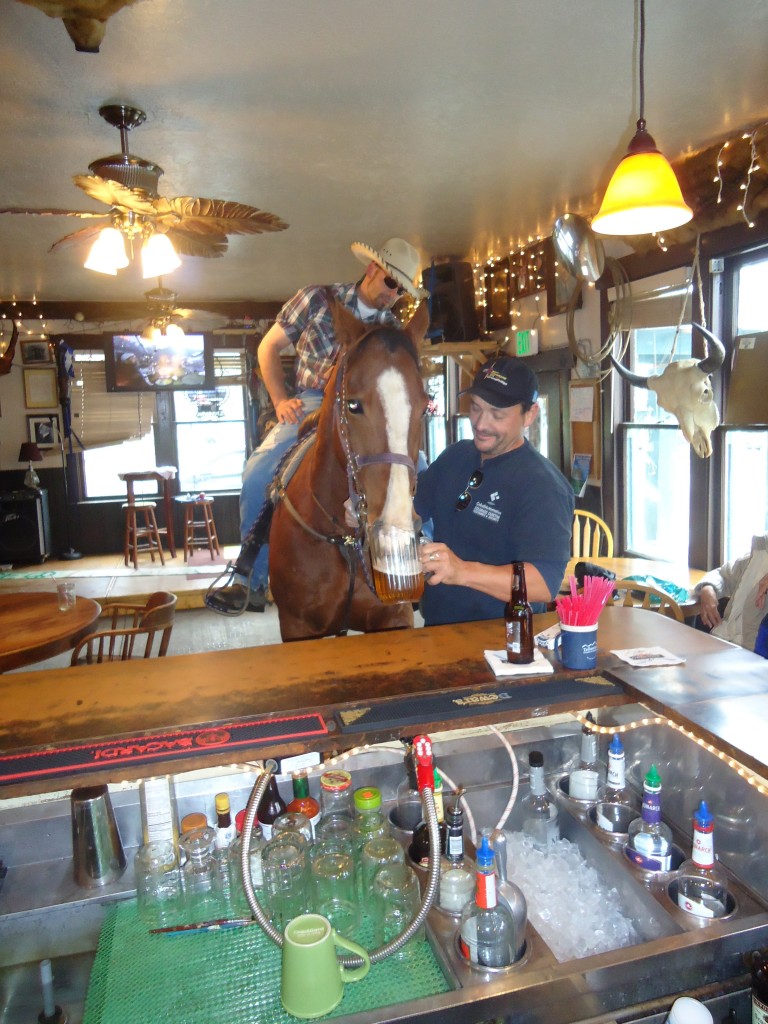
I know now that I’m definitely out of my league. “There’s a law against getting moose drunk?” I ask weakly, ashamed of my lack of legal knowledge.
She nods. “The moose used to come in here sometimes to drink. We’d give them a pitcher or two of beer, but one developed a regular habit. After awhile, after drinking his beer, he’d get mean and start stomping and kicking the shit out of people. So they had to pass a law against letting the moose drink.”
The Tea Pot Scandal Revenge
If it appears Talkeetna’s reputation as outlaw territory is based solely on its outlandish humor, there is a more somber and more riveting story to tell. On the walls of the Fairview Hotel is a framed newspaper clipping with the headline, “Death Followed President’s Alaska Trip”. According to the article, President Warren G. Harding pounded the golden spike for the Alaskan railroad in Nenana, on July 15, 1923. History tells us that while in Alaska, Harding fell ill. Although the records of his stay were obscure, the locals insist that after driving the spike, he rode the train to Talkeetna, where he had a few drinks, then died in San Francisco three days later.
The official story is that Harding died of a heart attack. Elected to the Presidency in 1921, his answer to the post war slump was to eliminate wartime controls and slash taxes, establish a Federal budget system, restore the high protective tariff, and impose tight limitations upon immigration. The newspapers hailed him as a fine statesman, who carried out his campaign promise, “less government in business and more business in government.”
Unfortunately for Harding, his business associates led him down a path that soon rumbled with accusations of corruption. Called the Teapot Dome Scandal, it involved a series of private leases taken out on oil fields that had been designated as military reserves in case of emergency. The investigation continued for several years after his death, finally returning the leases to the navy, but the accused business associates were so close to his administration, it was reported he once said, “My…friends…they’re the ones that keep me walking the floors (at) nights!”
It was also said that in the summer of 1923, just weeks before his death, he asked then Secretary of Commerce, Herbert Hoover. “If you knew of a great scandal in our administration, would you for the good of the country and the party expose it publicly or would you bury it?”
The official story is that the President succumbed to the stress of the Teapot Dome Scandal, collapsing in San Francisco just days after his return from Alaska, but for years the people of Talkeetna boasted that during his stay at the Fairview Inn, they had poisoned him. Dismissing any claims that Harding died a natural death, they point to the time frame as though to emphasize “what do you think would happen to an instrument of corruption in a place where the law is in the hands of the people?”
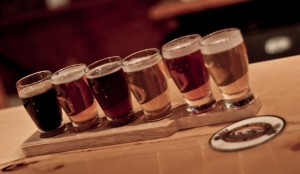
The Flavor of Talkeetna
Talkeetna is a live-in museum. The homes and businesses rivaling for their positions as the oldest established buildings, all date back to the early nineteen twenties. Other than minor repairs and the introduction of modern day technology, they are all of their original size, with the original stair cases, doors, window frames and room partitions. The stairways are narrow and the stairs creak loudly. A claw-footed bathtub occupies the communal bathroom that serves the hotel guests. The lounge seems almost incongruous with thick, hand fashioned bar stools and tables, yet a large color television offering full cable service dominating one corner.
At the Fairview, an aging piano is parked next to the entrance to the lounge. Apparently, everyone in Talkeetna knows how to play it. As the customers pass by, they stop for a moment to play some chords. Some just tinkle a few notes out hesitantly, while others play a full scale before moving on to other pastimes.
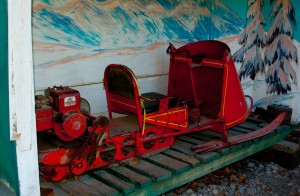
By roaming through the town, you run across such items as giant, rusted bear traps, old dog sleds, battered snow shoes, mountain climbing gear, antique automobiles and machinery; even an iron dog; one of the first snow machines, a heavy, daunting metal monster. These tools were the necessary equipment of the miners and trappers who first settled the town, and their lives haven’t changed drastically since. The machinery has been updated, as well as the survival gear for mountain living, and more areas have been blessed with the conveniences of electricity, but they are still primarily a subsistence people, depending on the resources of the land and a bit of luck to make it from one year to the next. The tourism in the summer, their winter festivals add the bonus of a little extra cash flow to make it from one year to the next.
We drowse in our museum piece, drinking remarkable beer on tap and unabashed to compliment on its flavor. After awhile, someone breaks out the secret; Talkeetna has its own brewery. This was enough information to start a full scale investigation. Sure enough, there it was in back, with big, glistening metal canisters, filtering systems and pressure valves. Actually, there were two breweries. Apparently one was not enough to fill all the local appetites.
Our beer sniffing abilities lead us to the doorway of Denali Brewery. Partnership owner, Boe Barnett was there to greet us and take us on a tour of the establishment. A brewer for ten years, he began working for Denali in 2009. Using many of his own recipes, he began turning out beers with some very intriguing names; Mother Ale, Algave Gold, Single Engine Red, Ring of Fire… “We won the State Fair’s Competition for People’s Choice this year,” says Boe. “This means Denali gets to make the official state beer for next year’s fair.” He pauses. “The name of the beer was Purple Haze. I don’t know if it was the name or the taste that sold it.”
“It was the name,” we assure him.
He laughs with us, then says, “why don’t you try it.”
He lines up a row of short, stubby beer glasses on the counter, filling each of them to the brim. They are astonishing; an art form. Exotic bubbles sparkle just below each surface, tiny bites of sunbeam flavor. The beer ranges in color, from blond to dark amber. He doesn’t say which one is Purple Haze. “Try them,” he urges.
“All of them?” There must have been at least a half dozen glasses lined up, and we’d already done a fair share of sampling Talkeetna’s favorite diet. This was a manly job, and one for women who could do the work of men. Starting with the more interesting colors, and only a small amount of encouragement from Bo; who seemed enthusiastic about having three expert tasters; we chugged down.
Chugging Denali brew may not be the wisest thing to do. Perhaps you’re supposed to sip and savor it, the way you do wine. It could have been a trick of the eye, but it seemed despite our quick demolition, the number of full glasses did not disappear right away. Not that we complained. By the time we’d left, we’d tried light, golden beer, sweet, ruddy amber, and an ale so dark, we were seeing lucky Irish leprechauns.
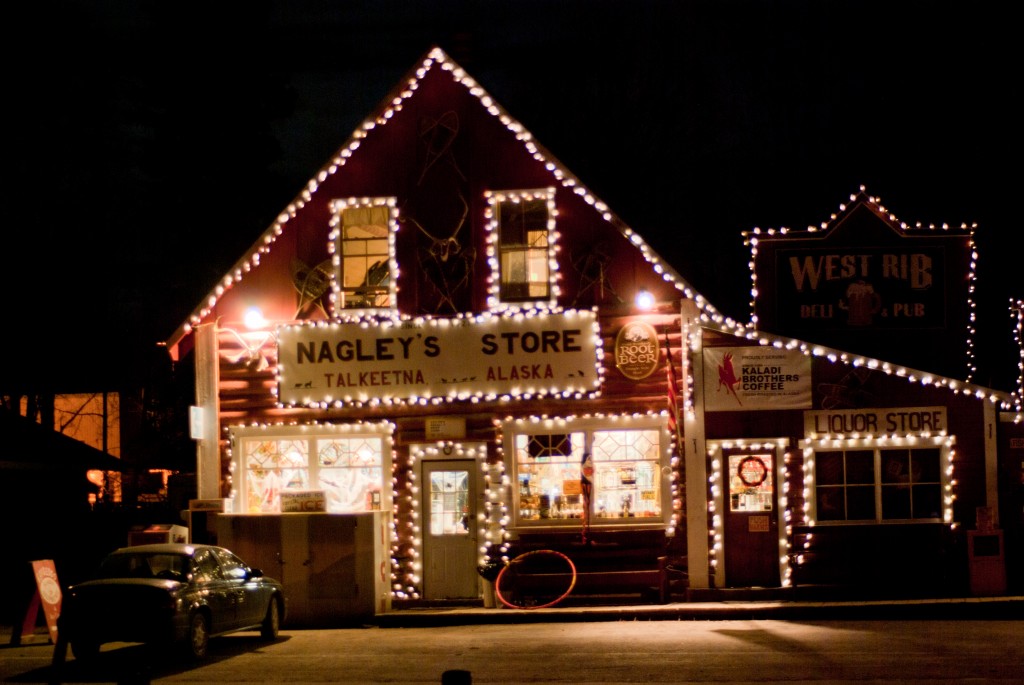
Somewhere in there, we must have gotten the Purple Haze. We float back to the hotel and up the stairs, barely conscious that management has announced open mic night. Somewhere in our feeble minds was guilty acknowledgment that here were the budding talents waiting to be discovered and we were on a discovery mission, but lethargy had overcome us. It wasn’t as though we couldn’t hear the auditions. There wasn’t much muffling the sounds floating to our attic rooms beyond the ancient floor boards.
The first musicians are gentle enough. They take their time tuning their instruments, and after a few trials and errors, discovering the right pitch for their songs, but as the evening progresses, the music becomes louder, more frantic and insistent. The performers become bawdier, more free hearted. As the evening wears on, a new pattern emerges. Before each audition, there is a crash as in tables over-turning and chairs falling. The microphone screeches like a hapless victim before the first chord resonates soundly throughout the building and spills out into the street. The rule seemed to be that whoever fell out of a chair, was the next one up to the microphone.
Somewhere in the sliver of time between the last auditing musicians and the first early morning risers, a quiet breathes, disturbed only by the ghosts who also enjoyed reveling in their bygone days. The building sighs and settles as old buildings do. As though from far away, there is a memory of a piano merrily tinkling, the chunk of gold nuggets, the splash of carefree laughter, a lament for a woman and a tune. We are at the end of the road where modern statements are no different than history and life is timeless. Our ghosts are just as colorful, just ribald, just as adventurous as their current counter-parts. We don’t worry about the ghosts any more than we do the rambunctious locals. As long as we weren’t politicians involved in an oil scandal, and maintained an unbridled sense of humor, we’d be okay.
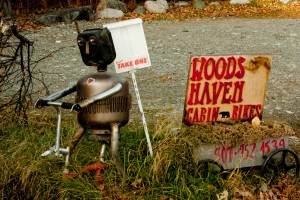
http://www.bachelorsoftalkeetna.org/wilderness-woman-contest.html
http://www.whitehouse.gov/about/presidents/warrenharding/
http://www.montgomerycollege.edu/Departments/hpolscrv/jzeck.html

Great job, Karlsie. It sounds like a fun trip. Love the anecdotes about the drunken moose and the poisoning of the president. Very conspiratorial entertainment 😉
Thank you, Mitch. I keep wondering about the poisoned president incident as the people are quite adamant that Harding did, indeed, stop over in Talkeetna. It is plausible. Talkeetna was booming in terms of miners, trappers and homesteaders who were carving out towns for their own heritage. It was the closest location to Nenana by railroad to have food and lodging accommodations and the most direct route to Anchorage, which he called a very healthy and flourishing infant. His death was very sudden, and even then, first heart attacks weren’t usually fatal.
Hey!,great read – you need a map to show where your travels are taking you. Can’t say if I’ve ever been to Talkeetna but maybe I have. Good weave of history, myth, and the what-not – keep it up.
It’s not so far fetched that Harding was done off, and maybe by someone in Talkeetna. He was after all a very corrupt man deeply embroiled in orgainized crime and spawning illegitimate children left and right. He was a cad and it wouldn’t surprise me at all that someone with some gumption sent him to his eternal reward in Alaska, the land where people rarely stand for such shenanagans.
Great Travel-Log.
“less government in business and more business in government.” LOL! Interestingly enough, I was watching the HBO series, “Empire,” which takes place during Harding’s time, and lat night’s segment touched upon his nomination. It seems that the more things change, the more they stay the same.
I really enjoyed this, since I am a big city boy who couldn’t find his way out of a national park and thought a hog was a cow. also, my only reference point re: Alaska is that TV show people from Alaska seem to hate, “Northern Lights.”
Now that I’m older, I wonder if i could better appreciate the rural. I could prolly write my novel and/ or memoirs during those long Alaskan nights. Perhaps I should auction off my bachelorhood first? LOL
Kenn, unless i’m mistaken, i believe the only real access to Talkeetna was by railroad or small aircraft until the Parks Highway was built in the early nineteen seventies. I remember a rudimentary gravel and pot hole road that went to Wasilla and Willow, but i think after that, it was at your own risk type of driving. If you follow a map of the Parks Highway, the Talkeetna Spur road is about twenty miles beyond the access to the Hatcher Pass. The Parks Highway changed the face of interior Alaska enormously, not only shifting the major transport lines for truck drivers, but creating new tourism destinations, such as the Hatcher Pass, Talkeetna, Denali and Nenana.
It’s very difficult to separate the myths and truths about Talkeetna to this day. The people live at the base of the Tall One, Denali (McKinley), and everyday they watch as the mists and clouds part to reveal its astounding dimensions. I think this constant revelation of how imposing, wild and ungoverned nature can be serves as an inspiration for those who would live without boundaries. For that reason, i’m in agreement with Grainne. When i first saw the newspaper clipping on the wall, i decided to research Harding and the Teapot Dome scandal a little bit. The evidence is inconclusive, as history has buried the event for nearly a hundred years, yet there is a very good chance that he stopped for a rest in Talkeetna, before continuing on his way to Anchorage, then to San Francisco. Here he was, among trappers and miners who lived by their own laws, which did not include a high approval rating for corruption in high office. I think if given the opportunity to poison a particularly disagreeable president, they would have done it, and proudly. Even Sutton, which is only twenty miles outside of Palmer, thus in the Sarah Palin home district, ran a local representative out of town, after burning an effigy on his front lawn, when he tried to remove the subsurface rights of property owners for the benefit of a natural gas company. I have no doubt that their next step would have been to take him on a tour into the mountains with a shortcut down from a very high cliff.
Eddie, i’m glad you enjoyed the story. The rural perspective is probably the smallest minority as suburbia creeps over farmland, smothering the local view under concrete and pocket lawns. In Alaska, we separate rural from remote; rural considered the small towns and villages accessible by road, and remote as the areas accessible only by boat, sleds or small aircraft. Talkeetna is on the border to remote. While about four hundred people live in the town proper, there are still many miners and trappers who hike or fly into town for their transactions. Others use the railroad, which serves as a sort of bus line for remote dwellers.
Most Alaskans don’t like any of the movies or television shows purported to represent an Alaskan population. Very few are actually filmed in Alaska, and of the ones that are, none of them give a true Alaskan perspective. They are all the white colonialist dream of being the hero and sage counselor to a population that really would not be able to get along very well without them. Their humor all points at the locals as being silly, frivolous and bumbling when the exact opposite is true. True Alaskan humor points its fingers right back at the colonialists for the ridiculous things they do in their remote towns. We have a name for people new to Alaska; chechackos, which is tantamount to being called a gringo. It’s negative only in that it means these are people who haven’t yet learned the cultural ways and values of the locals, but at least they are trying.
The other thing they find disagreeable is that this white colonialist dream fails to accurately depict the population demographics. Only forty-five percent of the state is white. The rest are indigenous, Asian or mixed, with a small percentage of Hispanic and black. The farther north you go, the more disparity you’ll find between gender ratios. While the Anchorage bowl has almost an even percentage of women to men, the male ratio steadily climbs higher, the more remote the access. In Talkeetna, the ratio of men to women is about four to one. In extremely remote communities, the ratio can be as high as one woman for every ten men. A true Alaskan show set in a small community, would have a high percentage of indigenous and Asian people, a low population of very rugged looking women and practically a non-existent middle class.
Artists, musicians and writers have all found Alaska to be a haven for their inspirational work, but Talkeetna is one of the more difficult areas to live in year round. The summers are wonderful, but the winters; isolated and vicious. The Panhandle towns have far more agreeable weather, are isolated only because they are on islands and absolutely stagger your mind with their beauty and abundance of marine animals. A large number of artists, musicians and writers have made Homer their year round home. It’s the thriving little fishing town where Jewel was discovered and which continues to be the target of International agents scouting for talent. Even more agreeable to me, and to a lot of people pining away for the day when they could retire and retreat from the common rat race, is Hope. Located across the bay from Anchorage, the tiny community has a serenity and pastoral setting rarely experienced anywhere. There are several large housing developments going up around the edges of Hope, but the people are highly resistant to modernization. Many property owners refuse to even have electric lines put in, so the grid is haphazard and dependent primarily on a locally owned power and communications co-operative company. Hope was an early gold town that went bust around nineteen thirty or so. There is no true source of income for the town, which does not greatly relish the hand hold of commercial tourism. Apart from the developers, the people who have invested in Hope in recent years, were people who could afford to live there because they were no longer dependent on receiving a paycheck. They like Hope just the way it is and i do, too.
Talkeetna may currently hold Alaska’s only bachelor’s auction, but don’t worry. Alaskan bachelors are well publicized. Along with the normal Internet routes and newspaper ads, there are a variety of seasonal hunts for the most eligible bachelors. Even Alaska magazine holds a yearly contest, but i’ll have to warn you. The largest number of women who respond to the most eligible variety are the New Alaskan woman, stuck in Anchorage because she couldn’t let go of her upper middle class values. The rural Alaskan woman, her attitudes, her relationship to men, is a whole different story and the premise for my Etta Mae tales.
Okay… you lost me when you mentioned the scarcity of women! LOL
Eddie, since you asked, i thought you should know. People who settle in and stay in rural Alaska do it for one reason only; it’s the place they love best. There just aren’t that many women who are willing to stray away from the bright lights, suffer the cold, the isolation and harsh living conditions for a spectacular view outside their windows.
I really enjoyed reading this blog post